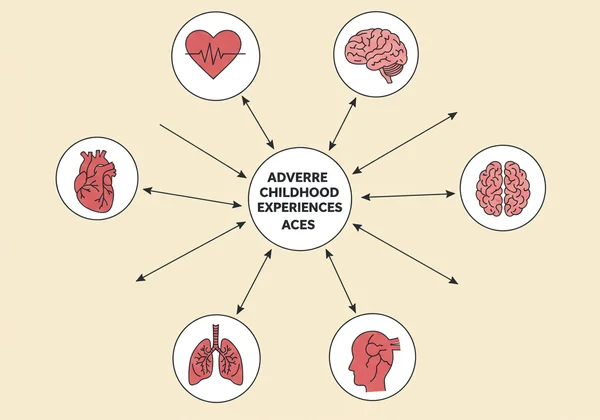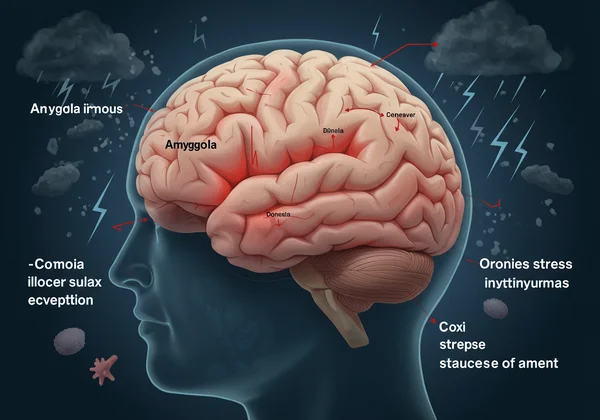High ACE Score: Understanding the Impact of Your ACE Test on Adult Health & Well-being
July 27, 2025 | By Jasper Quinn
Have you ever felt like your past is quietly influencing your present? You might be dealing with health issues, relationship patterns, or emotional responses that seem disconnected from your current life. Often, the roots of these challenges can be traced back to our earliest years. For many, understanding the impact of a high ACE score is the first step toward clarity and healing. But what does my ACE score mean for your life today?
This guide is here to help you unpack that question. We will explore the profound connection between Adverse Childhood Experiences (ACEs) and adult well-being. This knowledge isn't about assigning blame or dwelling on the past; it's about empowerment. By understanding how your childhood may have shaped you, you can take informed steps toward a healthier, richer future. The journey to self-awareness can begin with a single, simple step, and the best place to start is to take the free ACE test and gain your own personal insight.

The Core Connection: High ACE Scores and Health
The link between childhood adversity and adult health is one of the most significant discoveries in public health over the past few decades. A high ACE score is a powerful indicator of increased risk for various health problems later in life. This connection isn't about fate; it's about understanding the biological and psychological imprint that early stress can leave on a developing person.
Gaining knowledge about the ACEs impact is the first crucial step. By learning about these connections, you are no longer in the dark. You are equipping yourself with a map that can help you navigate your health and well-being with greater intention and self-compassion.
What is an ACE Score and Why Does it Matter?
An ACE Score comes from the Adverse Childhood Experiences study, a groundbreaking investigation by the CDC and Kaiser Permanente. It is a tally of ten specific types of abuse, neglect, and household dysfunction experienced before the age of 18. Each "yes" answer to a question on the ACE questionnaire adds one point to your score, ranging from 0 to 10.
Your score is not a judgment of your character or your life's potential. Instead, think of it as a measure of the cumulative stress you endured during your formative years. A higher score simply means you were exposed to more adversity, which can have lasting effects. Understanding this score is the key to unlocking why you might face certain challenges today.
Common Health Areas Affected by Childhood Trauma
The research is clear: childhood trauma can significantly affect adult health. Individuals with higher ACE scores show a statistically higher risk for a range of conditions. It's important to remember that these are risk factors, not certainties. Awareness allows for proactive management and prevention.
Some of the key health areas linked to high ACE scores include:
-
Chronic Physical Illness: Increased rates of heart disease, autoimmune disorders, chronic obstructive pulmonary disease (COPD), and liver disease.
-
Mental Health Conditions: Higher likelihood of depression, anxiety, post-traumatic stress disorder (PTSD), and suicide attempts.
-
Behavioral Challenges: Increased risk for substance use disorders, smoking, and other behaviors used to cope with underlying pain.

Decoding the Body's Response: Toxic Stress & ACEs
Why does childhood adversity have such a powerful physical effect? The answer lies in the toxic stress response. Stress is a normal part of life, but when a child experiences intense, frequent, or prolonged adversity without adequate adult support, the stress response system can become permanently overloaded. This is "toxic stress."
Imagine your body's alarm system is always on high alert. This constant activation disrupts the development of brain architecture and other organ systems, setting the stage for future health problems. Understanding this biological mechanism can help demystify the connection between your past experiences and your current health. To see how this might apply to you, you can get your score confidentially.
How Chronic Stress Impacts Brain Development
During childhood and adolescence, the brain is a construction site. Toxic stress can interfere with this building process in critical ways. It can lead to a larger, more reactive amygdala (the brain's fear center) and a less-developed prefrontal cortex (the center for decision-making and self-control).
This shift in brain development can explain many common adult struggles associated with high ACE scores. You might find yourself quick to anger, constantly anxious, or prone to impulsive decisions. These aren't character flaws; they are often the logical outcomes of a brain shaped by a stressful environment.

The Link Between ACEs, Inflammation, and Chronic Illness
One of the most direct pathways from a high ACE score to poor health is through inflammation. The toxic stress response floods the body with stress hormones like cortisol, which, over time, leads to chronic inflammation. This low-grade, persistent inflammation is a known culprit behind many major health issues.
From damaging blood vessels (contributing to heart disease) to dysregulating the immune system (a factor in autoimmune conditions), inflammation is a key bridge between early adversity and adult chronic illness. Knowing your ACE score can be a vital piece of information to share with your healthcare provider as you manage your long-term health.
Beyond Physical Health: Social & Mental Well-being
The impact of a high ACE score extends far beyond physical health. It weaves its way into our emotional lives, our behaviors, and how we connect with others. Understanding these patterns is essential for holistic healing and building a life that feels authentic and fulfilling. The journey can be challenging, but it starts with the courage to start your self-discovery.
Navigating Relationships and Attachment Styles
Our earliest relationships form the blueprint for how we connect with others as adults. When our childhood environment is unstable or unsafe, it can disrupt the development of secure attachment styles. As an adult, this might manifest as difficulty trusting others, an intense fear of abandonment, or a tendency to avoid intimacy altogether.
Recognizing these patterns is not about blaming your past. It’s about understanding the "why" behind your relational habits. This awareness allows you to consciously choose new ways of relating to others, fostering healthier and more secure connections in your adult life.
Psychological Impacts: From Anxiety to Resilience
Living with the legacy of a high ACE score can feel like navigating the world with a heightened sense of threat. This can lead to persistent anxiety, depression, and a feeling of being emotionally overwhelmed. However, this is only half of the story. The other, more powerful half, is resilience.
Resilience is the ability to adapt and thrive in the face of adversity. Humans are incredibly resilient, and your experiences, while painful, may have also forged incredible strength, empathy, and wisdom. Knowing your ACE score is the first step in harnessing that resilience and turning post-traumatic stress into post-traumatic growth.

Your ACE Score: A Path to Empowerment and Healing
Discovering you have a high ACE score is not a final diagnosis or a life sentence. It is a powerful piece of information that can illuminate your path forward. It provides a compassionate explanation for struggles you may have faced and offers a roadmap for healing and self-care. Your score doesn’t define you, but understanding it can liberate you.
Knowledge is power, and the journey of a thousand miles begins with a single step. By taking a moment to understand your past, you are investing in a healthier and more conscious future. We invite you to begin that journey today. Discover your ACE score today on our confidential, secure platform and take the first step toward a richer life.
Frequently Asked Questions About ACE Scores and Health
What does my ACE score mean?
Your ACE score is a count of different types of adverse experiences you faced in childhood. A higher score (e.g., 4 or more) is linked to a higher risk for various physical and mental health issues in adulthood. It is best viewed as a screening tool that provides insight into your potential health risks, not as a definitive prediction of your future.
Can you recover from a high ACE score?
Absolutely. The human brain and body have a remarkable capacity for healing. While we cannot change the past, we can change how it affects us. Building resilience through safe relationships, therapy, mindfulness practices, and positive lifestyle changes can significantly mitigate the effects of a high ACE score.
What is a toxic stress response?
A toxic stress response occurs when a child experiences strong, frequent, or prolonged adversity—such as that measured by the ACE test—without adequate adult support. This prolonged activation of the stress response systems can disrupt the development of the brain and other body systems, leading to long-term health consequences.
How accurate is the ACE test?
The ACE test is a highly validated screening tool based on the landmark CDC-Kaiser Permanente ACE Study. It accurately measures exposure to 10 specific types of childhood adversity. However, it's crucial to remember it is a screening tool, not a medical diagnosis. For a comprehensive evaluation, you should discuss your results and concerns with a qualified healthcare or mental health professional. You can take the ACE questionnaire on our site, which is based on this foundational research.